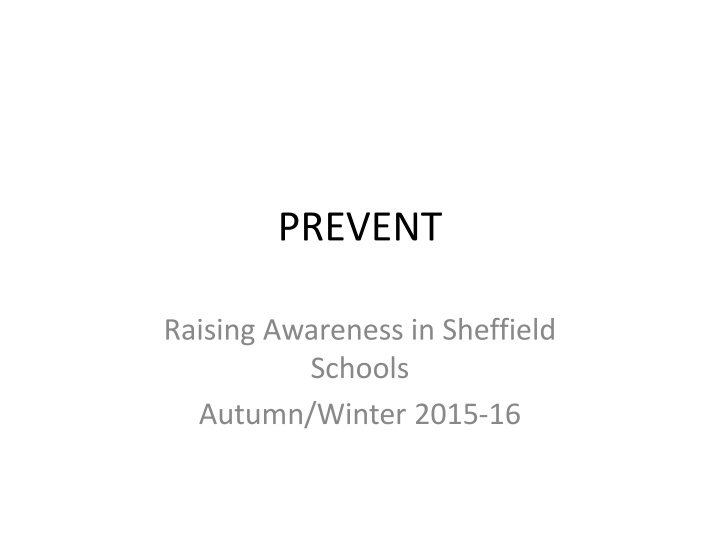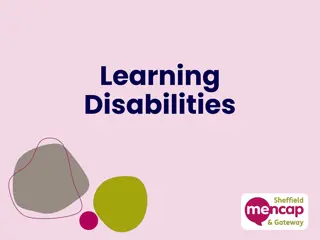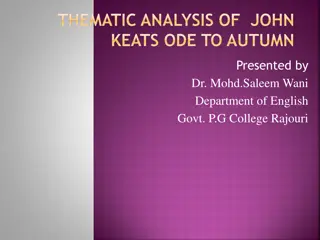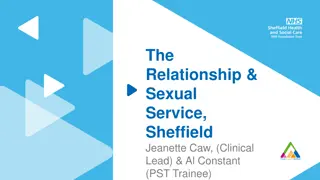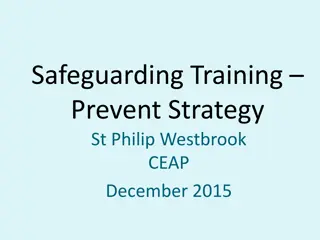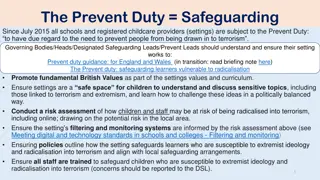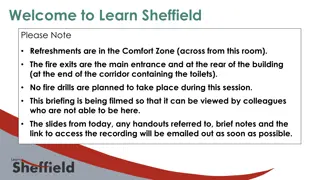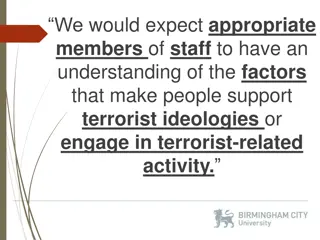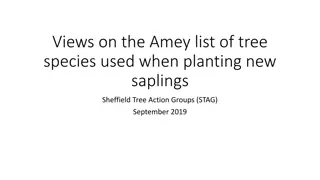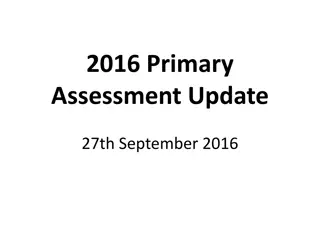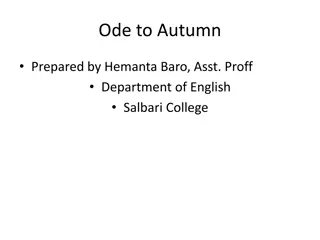PREVENT Strategy Implementation in Sheffield Schools: Autumn/Winter 2015-16
Raising awareness of the PREVENT strategy in Sheffield schools during the Autumn/Winter term of 2015-16 is crucial for safeguarding and preventing individuals from supporting terrorism. The strategy emphasizes the duty of schools to address all forms of terrorism through various initiatives like workshops and curriculum adjustments. Key duties for schools and childcare providers include risk assessment, safeguarding policies, referral pathways, and staff training to recognize risks and challenge extremist ideas. Government regulations outline the responsibilities of educational institutions to prevent radicalization and extremism, with monitoring by Ofsted and DFE ensuring compliance.
Download Presentation

Please find below an Image/Link to download the presentation.
The content on the website is provided AS IS for your information and personal use only. It may not be sold, licensed, or shared on other websites without obtaining consent from the author.If you encounter any issues during the download, it is possible that the publisher has removed the file from their server.
You are allowed to download the files provided on this website for personal or commercial use, subject to the condition that they are used lawfully. All files are the property of their respective owners.
The content on the website is provided AS IS for your information and personal use only. It may not be sold, licensed, or shared on other websites without obtaining consent from the author.
E N D
Presentation Transcript
PREVENT Raising Awareness in Sheffield Schools Autumn/Winter 2015-16
We will cover. A brief introduction to PREVENT Safeguarding Duties Workshop to Raise Awareness of Prevent (WRAP) Implementation of the duty in schools
Prevent A strand of Govt s Counter-Terrorism Strategy To stop people becoming terrorists or supporting terrorism Pre-criminal / Safeguarding Addresses all forms of terrorism Counter-Terrorism and Security Act 2015 puts Prevent on a statutory footing for local partners: 1 July 2015 3
Counter-Terrorism and Security Act 2015 Covers: Local Authorities; Schools and childcare providers*; FE institutions; HE institutions; Health sector; Prisons and Probation; Police Forces Have due regard to the need to prevent people from being drawn into terrorism *Maintained schools; Non-maintained special schools; Alternative provision academies; Independent schools (including academies and free schools); Pupil Referral Units; Maintained nursery schools; Registered childcare providers (including childminders); School based childcare; Holiday schemes for disabled children. 4
Schools and Childcare - key duties A broad and balanced curriculum Risk assessment with local partners Robust safeguarding policies including referral pathways and visiting speakers Link with Local Safeguarding Children Board Raise awareness of staff to recognise children at risk, know how to access local support, and to challenge extremist ideas Address online safety of pupils 5
Ofsted/DFE Ofsted: Common Inspection Framework education, skills and early years Para 28: make sure that safeguarding arrangements to protect children, young people and learners meet all statutory and other government requirements, promote their welfare and prevent radicalisation and extremism. Ofsted: Inspecting safeguarding in early years, education and skills settings Para 18: Consider evidence that there is a clear approach to implementing the Prevent duty and keeping children and learners safe from the dangers of radicalisation and extremism DfE: Keeping Children Safe in Education July 2015 DfE: ThePreventduty adviceforschoolsandchildcare providers 6
Prevent Duty the local response Prevent is a safeguarding issue part of our mainstream approach to safeguarding Links to Sheffield Safeguarding Children Board / Service and the Safer and Sustainable Communities Partnership Proportionate response to local risk across a range of services: Youth Justice, Community Youth Teams, Schools, Safeguarding, FE and HE institutions 7
Safeguarding Issues Don t focus on one particular community, broad range of groups who have been involved in extreme behaviours, e.g. animal rights, nationalist organisations, far right, etc Dangers of stereotyping a particular group of people as terrorists : Not statistically true Miss signs & indicators from other children & young people Harder to work with families if feel victimised About safeguarding children & young people in same ways as other concerns
Safeguarding Guidance: Preventing Extremism & Radicalisation Radicalisation refers to the process by which a person comes to support terrorism and extremism. These ideas can include violent far right views, animal rights activism, & religious fundamentalism. They may also be about opposition to fundamental values, including democracy, the rule of law, individual liberty and mutual respect and tolerance of different faiths and beliefs. Protecting students from the risk of radicalisation is similar to protecting them from harm and abuse. Staff and volunteers in all agencies must make a referral to Children s Social Care if they believe or suspect that a child is suffering or likely to suffer Significant Harm, including possible exposure to radicalisation and extremist views. If a student might be at risk: You should inform your DSD/L immediately The DSL/D will assess the needs of the student and their family through a Family Common Assessment (FCAF) if the concern is low level The FCAF can then be used to request support through the Multi-Agency Support Teams (MAST) including access to the voluntary Channel programme If the concern appears to be serious and/or immediate, the DSL/D immediately to Children s Social Care (contact details can be found here) If necessary, Children s Social Care & the Police will hold a Strategy Meeting to discuss the concerns & involve other services as required Schools safeguarding policy, Sept 15 (available from Safeguarding Sheffield Children website, schools section, policies & procedures) Referral process, currently via: Prevent duty: From 1 July 2015 all schools must have due regard to the need to prevent people from being drawn into terrorism. This duty is expected to apply to sixth form colleges and FE colleges in the autumn. The Prevent duty does not stop students from debating controversial issues, or require staff to carry out unnecessary intrusion into family life. Staff should always be alert to changes in student s behaviour which could indicate that they may be in will refer this Safeguarding Children Advisory Service, need of help or protection. Factors that make a student vulnerable include: Pressure from peers, other people or the internet Crime against them or their involvement in crime Anti-social behaviour and bullying Family tensions Race or hate crime Lack of self-esteem or identity Personal or political grievances The voluntary Channel programme assesses vulnerability using a framework built around: Engagement with a group, cause or ideology Intent to cause harm Capability to cause harm. For more information use the link above or here. MAST or Children s Social Care can refer students to this programme once an assessment of need has been completed. tel. 2053535, Mon-Fri, 9 am 5 pm, Schools should support students and staff by: Discussing & challenging these ideas with students through the curriculum, debates, etc. Ensure staff are aware of & use procedures for protecting & assessing students at risk Build on local partnerships, policies & procedures of the Sheffield Safeguarding Children Board Ensuring that the Designated Safeguarding Lead & Deputy (DSL/D) undertake Prevent training (mandatory for DSL/D s) Ensuring the DSL/D awareness, advice and support to staff Ensure that students are safe from terrorist and extremist material when accessing the internet in their education setting If you are a practitioner & need further advice, please contact: Safeguarding Children Advisory Service Mon Fri, 9am - 5pm, tel. 2053535 Email: safeguardingchildrenadvice@sheffield.gov.uk Useful resources: The Prevent Duty, DFE 2015 - Departmental advice for schools Keeping Children Safe in Education, DFE 15 Terrorism Act 2000 Channel Guidance, HO 2015 provides briefings, Version 9, September 2015 www.safeguardingsheffieldchildren.org.uk
WRAP Workshop Home Office recommended training for frontline public sector staff 2 groups 1 hours
Implementing Prevent Ofsted emerging good practice Leadership and governance by Heads and Senior Leadership Teams Training and briefing covering all school staff Policies and practices within mainstream and specific policies Curriculum formal / informal to meet local circumstances debate should not be shut down Referral pathways internal and external - all staff aware
To take away How will you start to implement the PREVENT duty in your school including: Ensuring a broad and balanced curriculum? Developing relevant policies or procedures? Raising awareness with staff, governors, pupils, parents and the wider community? Identifying and responding to risks? What help might you need and where might you get it from? What resources might you need?
ICT systems key points School network systems are the responsibility of the school, either supported in-house or by external support provider. The LA can advise on filtering and information security in the context of Prevent Most schools take Internet access via the LA Broadband network includes a Regional filtering platform, provided by Yorkshire & Humber Grid for Learning (YHGfL) Filtering platform can address key risks, including proxy bypass and encrypted sites Systems are only part of the solution, vigilance is needed around IT use including pupils own devices etc. as technology and pupils use of it changes quickly More information from YHGfL (www.ict4c.co.uk), or via LA e- safety lead julia.codman@sheffield.gov.uk
Reporting concerns Discuss your concerns through your internal safeguarding processes, with a colleague or manager If you still have PREVENT concerns and wish to discuss further or escalate, contact: Safeguarding Children Advisory Service 01142053535 safeguardingchildrenadvice@sheffield.gov.uk Or the SYP Prevent team (Jo Batty / Brendan Pakenham) via 101 or your local Police contact
Sources of further help and resources Advice on the Safeguarding Sheffield Children Website: https://www.safeguardingsheffieldchildren.org.uk/welcome/Schools- other-education-settings/Schools-Education-Settings-Policies- Procedures.html Local E-safety guidance training and curriculum. Julia.codman@sheffield.gov.uk National resources via DfE https://www.gov.uk/government/publications/preventing-extremism-in- schools-and-childrens-services/preventing-extremism-in-the-education- and-childrens-services-sectors www.educateagainsthate.com New Govt website with useful links to a range of resources (curriculum, policy, etc). https://www.tes.com/teaching-resource/tackling-extremism-in-schools- 11105440 www.preventforschools.org is a growing library of resources for schools on the issue
End Evaluation forms Slides available on the Learn Sheffield website
